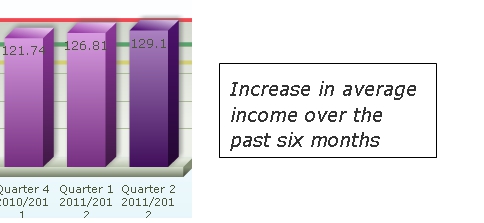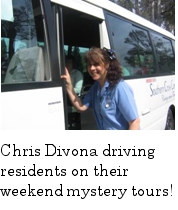When and How You Collect Resident Satisfaction Data is Important
When and How You Collect Resident Satisfaction Data is Important
Mt Esk Aged Care Facility is a 98 bed ageing in place facility in Launceston, Tasmania. It is owned and operated by Southern Cross Care (Tas) Inc. and has been benchmarking its performance outcomes with QPS Benchmarking for eight years. Facility Manager, Rebecca Eiszele, holds a strong belief that many of the QPS key performance indicators are connected to one another, and that: high quality outcomes can only be achieved through staff and resident engagement in the collection of data; and, a good understanding of the results by all concerned.
Two years ago, Rebecca realised that the results for resident and relative satisfaction indicated that Mt Esk was not achieving outcomes that the facility should be altogether comfortable with. The overall result (78%) was not too far away from the industry average but the participation rate was low and this indicated that there was an opportunity to improve the level of engagement. Approximately 30% of residents capable of completing the survey were doing so. Rebecca was also cognisant of the fact that the process of collecting resident satisfaction data provided a wonderful opportunity to collect more qualitative information about the needs and aspirations of the residents.
The question "how do we get our aged care residents to participate in the surveys?" is a common one for aged care facilities. As with many aged care facilities, Rebecca realised that she had a good volunteer workforce and found two volunteers that she could train and support to help engage the residents in the satisfaction survey process. These two volunteers have been used consistently for the last two years and it is both hoped and planned for, that consistency can be maintained into the future. "Even if we lose one volunteer it is hoped that we can keep the other one whilst the second person steps up into the role with the support of the other. In this way we can keep a consistent approach", claims Rebecca. It should be noted when Associate Professor Rod O'Connor was reviewing the QPS Benchmarking satisfaction survey he recommended that facilities adopt a consistent approach to the survey process and do their best to stick with it. The team at Mount Esk is following this advice.
The next important decision was to decide when to conduct the surveys. The facility management contends that it is important to do the surveys as early as possible in the quarter. Completing satisfaction surveys takes time and effort and letting them run close to the Christmas period brings unnecessary complications. "You have to keep in mind the needs of the volunteers doing the survey interview" says Rebecca. Completing 30-40 interviews takes a considerable amount of time and it is evident that some of the residents take the opportunity to 'have a chat'. It is important to avoid putting time constraints on the process, "we want our residents to have the best possible opportunity to express their thoughts, to vent their frustrations, to mention those 'little things' to the volunteer interviewers that sometimes make the biggest difference. In some respects, having the opportunity to have a chat and express thoughts in a relaxed manner, contributes in itself, to a degree of satisfaction".
It is important not to overlook the fact that the interview process can be a quality communication process in its own right. If you were an aged care resident, which process would make you think that the aged care facility is really interested in your views and committed to making changes?:
- Simply receiving a form each year and filling it in; or
- Having someone come and spend an hour or so interviewing you, helping you to complete the form and encouraging you to comment on even the smallest of things.
Mount Esk's satisfaction levels have jumped in the past two years. In part, this improved outcome has resulted from residents realising that management are now very serious about spending time with them, as individuals, to seek their views. The facility has come to better understand the importance of the more 'qualitative' interview and the engagement of both volunteers and residents in the process. Another benefit is that sometimes little issues that can grow into more significant ones are nipped in the bud before they end up being a source of dissatisfaction or a complaint.
Up until this point it might be construed that Mount Esk are arguing against the belief 'that actions speak louder than words'. "At Mount Esk we like to think we have actions and words on the same volume setting". Good resident care starts with an accurate assessment of the resident's needs and two years ago it would be fair to say that the processes for ACFI assessment were not all that they could be. In the past 9 months the facility has seen an $8 per day increase in the average daily rate with significant gains in the area of Complex Needs. Additional services have been provided and the improvements have been 'marketed' back to the residents to enhance their understanding that they are being provided with the best possible home to live in and services to match.

"...actions and words on the same volume setting...."
The results of the surveys and indeed discussions with trained volunteer interviewers indicated that the facility was falling short in the area of leisure and lifestyle activities. This was not an area where the problems could be resolved alone by better communication. Indeed, a call to action was indicated. Following lengthy discussion there was a complete restructure of the department that included:
- Increased weekend hours for lifestyle and leisure activities - four hours on Saturday and three hours on Sunday were added to the lifestyle roster. This was, in part, funded by the improvements in the area of ACFI assessment.
- We needed to add more variety into our lifestyle programs. There is now a commitment to add at least one new activity each month and drop one other activity. Activities Coordinator Dee McLachlan has been instrumental in working with the residents and activities staff to re-energize the programs. Despite the need for change Bingo is still a sacrosanct resident activity and sounds of "66 clickety click" still resonate around the facility.
- It was important for the activities staff to start thinking 'outside the square' and this led to a bus trip to a mystery community event on every second weekend. When we think about activities in aged care we often think in terms of set routine but maybe we need to keep in mind the need for spontaneity. One of the lifestyle staff, Chris Divona was taught to drive the 18 seater bus and now Chris with the assistance of a volunteer does the weekend mystery tour.?

- Music therapy and access to a Men's Shed just five minutes drive down the road has expanded the range of programs.
- Some residents have become more actively involved in expanding the activities program. One resident named Jack leads a poetry group whilst another lady helps with the morning teas. Bingo would not be the same without the help of Father Pat.
In summary, you should plan to extract the maximum benefit from your resident and relative satisfaction surveying processes. It is not just about the analysis of the results, but also, the process of collecting the data. Do this well and make it an opportunity to both send and receive important messages to and from the residents. In this way you can enhance communication to such a point that residents feel comfortable in scoring the organisation at a higher level, that is, the survey interview process has helped to get messages across and change the perception of the residents.?


0 comments